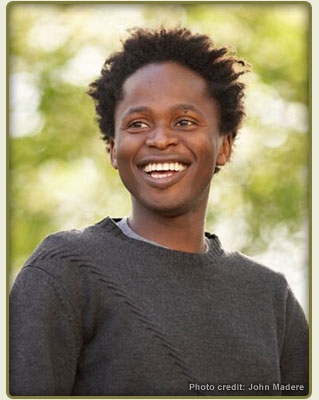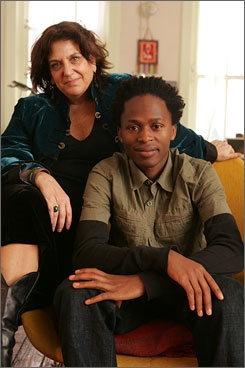 |
| Ishmael Beah (alongwaygone.com) |
A hero is someone who tries to make the world a better place, who overcomes obstacles, and/or is not afraid to stand up for what is right.
It is important to have a hero because everyone needs a positive image to look up to and take examples from. There needs to be someone to help guide you on the right path. If a person has a hero, the hero can be there to help the person make good choices.
The character in the novel A Long Way Gone that portrays the characteristics of a hero is Ishmael Beah. He grew up as a normal boy in Sierra Leone with a love of rap music, until he was twelve years old. His village was attacked while he was out performing at a talent show with friends, and from that point he had to go on with life with only his brother left as his remaining family. "That night for the first time in my life I realized that its the physical presence of people and their spirits that gives a town life" (Beah 22). Ishmael stayed with his friends, trying to avoid death or capture, by the rebels, or by scared civilians. The boys dealt with constant hunger and saw things that no person, adult or child, should ever have to witness. After an attacked in their new village, Ishmael never again saw his brother or three friends and ultimately left his last friend trying to find somewhere to go. Ishmael met a new group of people and they stayed together for a long time. Eventually they were taken as soldiers for the army. The army changed the boys and made them blood hungry, killing any opposing rebel thoughtlessly. "We had been fighting for over two years, and killing had become a daily activity. I had no pity. My childhood had gone by without my knowing, and it seemed as if my heart had frozen" (Beah 126). Ishmael was ultimately taken to a UNICEF rehab camp where after a lot of hard work he finally relearned to be peaceful. "At the soccer match, all I could think about was the discovery of a family I never thought existed" (Beah 178). He eventually moved in with his uncle and even later moved to America. He found love again.
Ishmael Beah should be inducted into the hall of fame for many reasons. One reason is because he experienced many things that no one should ever have to deal with. At the age of twelve, his family was torn apart by war, leaving only he and his brother together with some friends. Ishmael was able to fend for himself. He saw many things that kept him up at night, but was still able to continue to move on each day. Another reason he should be inducted into the hall of fame is because even after he lived as a child soldier for two years and did and experienced many things, he still recovered in rehab. He was able to represent Sierra Leone in a UN conference. He ultimately made a home for himself in America. Ishmael Beah overcame tremendous obstacles throughout his childhood. He has also spoken before many organizations standing up for what he believes is right. He is more than qualified to be inducted in the hero hall of fame.
 |
| Laura Simms and Ishmael Beah (http://www.usatoday.com/life/books/news/2007-02-14-beah-book_x.htm) |
An Interview with Ishmael Beah (not real)
Aisha(interviewer): When you were younger, before the war became a part of your life, what was important to you? Ishmael: As a child I loved to listen to rap music. My friends and I would watch rap videos on TV and try to imitate them. We wore baggy pants and carried our cassette players around so that we could listen to our rap tapes. I also loved to play soccer. Aisha: How has the war changed the importance of those things? Ishamel: Well I really grew up after the war. My family was always important to me, but I really valued them much more after they were no longer there. You don't appreciate the importance of family until they are gone and then their presence is greatly missed. Aisha: What was the hardest part of being a child soldier? Ishmael: The hardest part of being a child soldier was when people who were close to me would die fighting. It was also constant exhaustion. I kept going by thinking that everytime I killed a person, I was avenging the deaths of my family. Aisha: Do you have regrets for what you did as a soldier? Ishmael: I do feel bad when I think back on how I killed the opposers without sympathy, and not always by just a simple shot, either. I killed cruelly. I also think, though, that I was taught to do that. I was crazy at my point as a soldier. I was on drugs that the older soldiers gave to me. I was overcome by the sights of death and torture that I witnessed everyday, the constant fear for my life, and the grief for the loss of my family. Myself as a soldier seems like a completely different person than who I am now. Aisha: What is your view on war? Ishmael: I think war is a horrible thing. During war, countless lives are taken and infinite blood is shed, all for a cause that is never resolved. There is no winner of war, all are losers in the end. Aisha: How have people helped shape your life? Ishmael: Well, negatively, all of the rebels that started the war and killed my family have definitely had a huge impact on my life, along with the army soldiers who gathered me to join. Positively, though, many people have shaped my life: Esther, my uncle, Laura. In rehab, Esther helped me become human again. She helped me regain trust and love and was there for me to talk to and get out my feelings. My uncle was so kind to me after being discovered as my remaining family. I loved when he would come and visit me in rehab and I was so blessed to get to stay with him after completing my treatment. Laura Simms was there for me during the UN conference and after when I needed somewhere to stay. She is my mother now. Aisha: How do you characterize a hero? Ishmael: A hero is someone who is perseverent. A hero will come back again and again to try to help make something right. A hero will also sacrifice without thought to help someone else out. Aisha: Who is your personal hero and why? Ishmael: I have two heroes. Esther, the nurse from rehab, is my hero because she really helped me open up and recover. She helped me become who I am today. No matter how much I did to her, she was relentless and always came back to help me. Laura Simms, my mother, is also my hero. When I first visited her house during the UN conference trip, I loved it because it had items that all of the children attending the conference could relate to. Her house felt like home. After my uncle passed away and the war had restarted and I needed somewhere to go, I called her. Immediately when I asked her if I could stay with her, she said yes. Both of those women are heroes to me because they were willing to give up to help me. They showed true love and care. Aisha: Do you think of yourself as a role model? Ishmael: I don't know that I think of myself as a role model. I have done a lot of things in my soldier days that I would want no one else to do. However, I was able to recover from those experiences and I think that if someone would like to look at me as a role model based on those practices, I would be more than happy for them to do so. I would love to be a role model for perseverance and working to change things that are wrong. Aisha: What did you hope to gain by writing your book? Ishmael: I hoped that by reading my experience, people could become aware of the reality of war and child soldiers. Unfortunately this problem isn't limited to Sierra Leone and things like these still go on in other countries. I want people to know the seriousness of such things. I also wanted people to be aware that anything is possible. If I was able to recover from such an experience, anything can happen. Never say never.Page created on 4/12/2011 2:43:35 PM
Last edited 4/12/2011 2:43:35 PM
Beah, Ishmael . A Long Way Gone. New York: Sarah Crichton Books, 1991.
